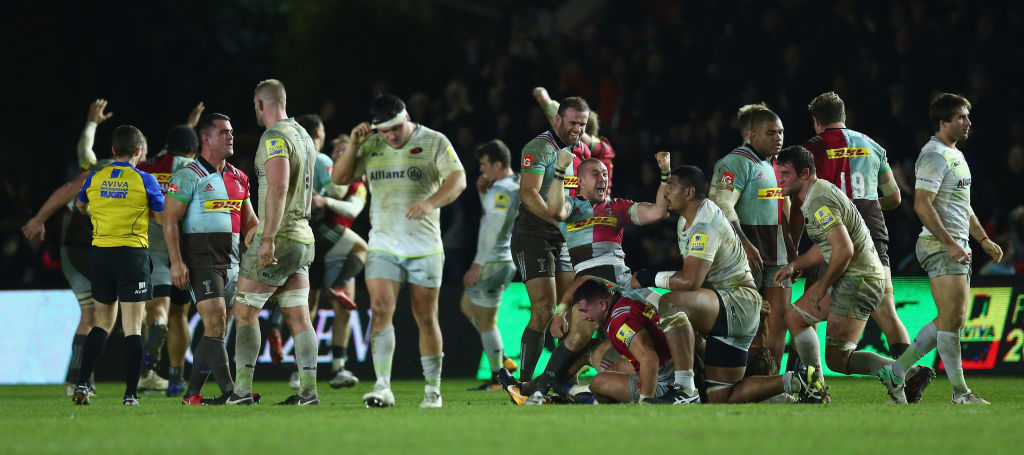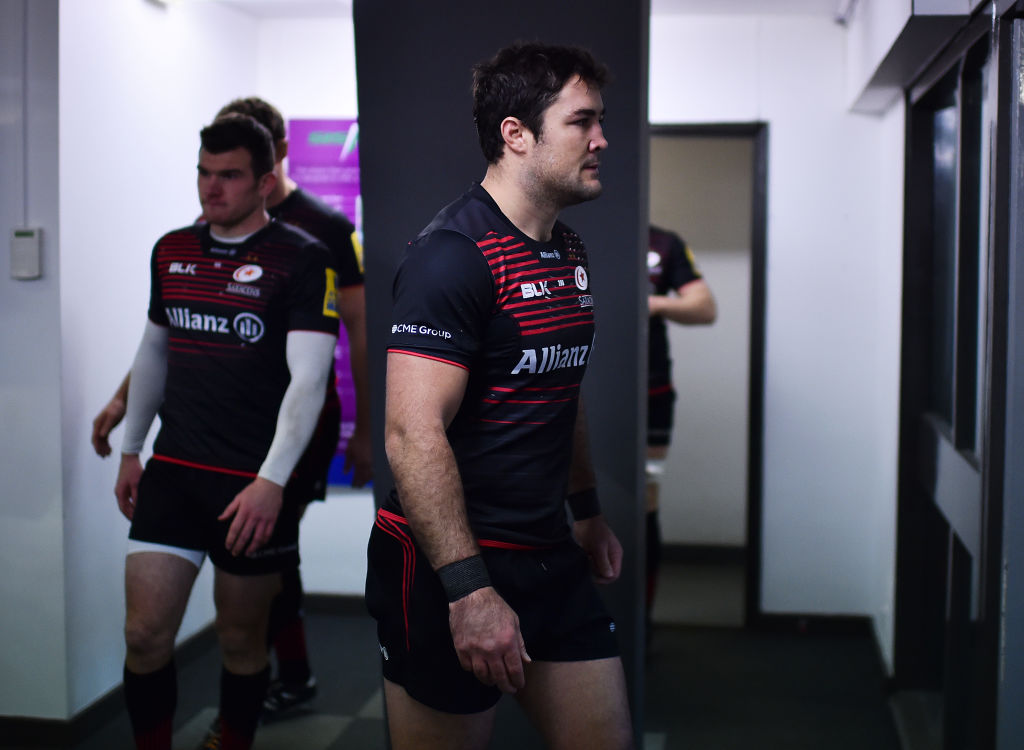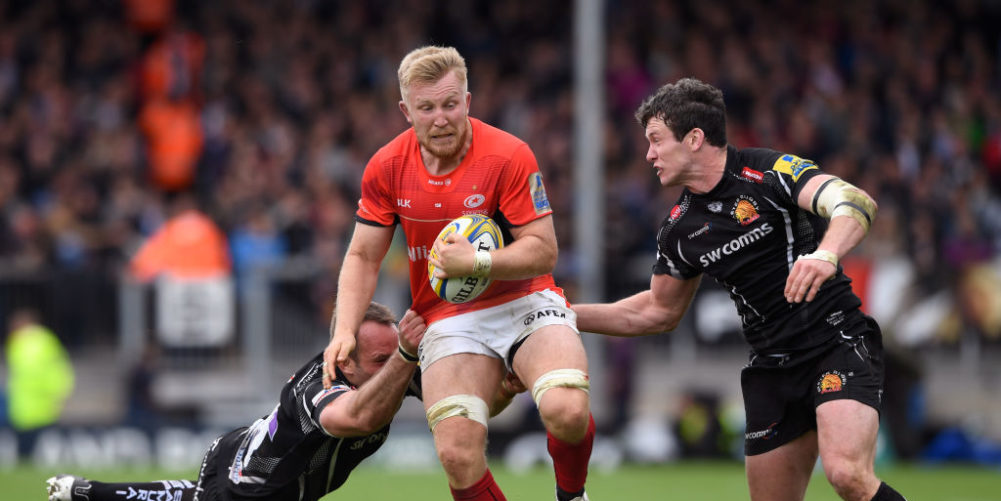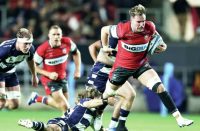(Photo: Getty Images)
By Nick Cain
JACKSON Wray is the selfless grafter that no club aspiring to greatness can do without. The European champions set great store by the wolf-pack mentality that has taken them to the pinnacle of the game, and Wray is like one of those tireless chasers in the pack who never give up, running down prey through unbreakable stamina and unbending willpower.
It has not brought the versatile 27-year-old forward the international fame and fortune enjoyed by Saracens team-mates like Owen Farrell, Jamie George, and George Kruis, who were in his academy intake and remain his closest friends.
England’s failure to include Wray in any training camp bar Stuart Lancaster’s long squad of 55 in 2014 has baffled Saracens rugby director Mark McCall, who is convinced that if Red Rose coach Eddie Jones saw what he does in training he’d be hooked.
Wray’s value to Saracens, who he has been with man and boy, is priceless. It is reflected in his two European Cup winners medals, earned as a starter in last season’s spectacular win over Clermont in the final, and off the bench in the inaugural win over Racing the previous season.
When you add to that two Premiership titles from the Saracens victories over Bath in 2015 and Exeter in 2016, as well as a place in the 23 for their first European Cup final defeat by Jonny Wilkinson’s Toulon in 2014, and the magnitude of what Wray has achieved comes into focus.
He has remained a first team stalwart despite Saracens having a parade of outstanding back row forwards during his 11-year stint with them, with Billy Vunipola, Maro Itoje, Schalk Burger, Michael Rhodes, Callum Clark and Joel Conlon among his rivals for a back row berth this season, and the likes of the now retired Jacques Burger, Will Fraser and Ernst Joubert to contend with before that.
It has meant that Wray has developed mental resilience to go with the pace and power that make him one of the most effective close-quarter carriers in the Premiership – and he has had the chance to prove it with Vunipola, Rhodes and now Itoje on the injured list.
“When everyone is fit in this team I just want to play,” Wray says. “That’s my main aim – to contribute to this team – and I’m not too fussed whether I am at 6, 7, or 8. I may be different to some 7s but I adapt to what fits in that area. My overall approach is the same in each position, but there is a different emphasis. For instance, at 8 it’s about delivery of the ball, at 6 more about line-outs, and at 7 being on the ball all the time.”

Wray says the last-minute 20-19 away loss to Harlequins the weekend before last, was a sickener – but that it has served as a timely reminder to a side hunting an unprecedented English European Cup treble that they are on everyone’s hit-list.
“Immediately afterwards it was difficult, and emotions were running high at first – but then you break it down. Discipline was a big thing, and a lot of what they got was from our mistakes. You need to learn from it, and it has been a bit of a common theme throughout the last few weeks.
“Maybe that’s a good thing. It’s a wake-up call, and tells us that we need to be sharper because if we give others a sniff they will take it.”
Wray adds that there is no hiding at Saracens when it comes to post-mortems. “We are quite pragmatic. You have to learn from setbacks and never sweep things under the carpet. It’s about problem-solving. It can be uncomfortable, but it’s not a witch-hunt. It’s about honesty from a group of players who want to be better, and it’s never personal.”
It is why he dismisses the notion that the losing streak has dented confidence: “Not at all. The manner of the defeats were all similar, whether a lack of discipline, switching off at times like we did against Exeter, or poor decision-making like against Gloucester. What we do works, and it’s about getting back to it.
“There’s always been something to overcome most seasons. We’ve had some unbelievable highs during the time I’ve been at Saracens, but also some lows. The way you get back on track is to be honest – that’s the only way.”
Wray’s sense of the importance of the collective surfaces throughout the interview. He says he is Essex through and through having grown up in Benfleet, and even though his parents come from the north-east – his mum is from Sunderland and his dad from Billingham near Middlesbrough – he is a staunch West Ham fan.
“I played my junior rugby for Westcliff but I’ve always been a keen West Ham supporter. I’m quite into it, and although Owen Farrell gives me stick and says I know nothing about the game, I watch them as much as I can. I like the new stadium, and although not many feel the same way, I think it’s for the best. You can only make an atmosphere if the team give you something. They did that in the draw against Leicester, and that was a great atmosphere – one of the best I’ve experienced.”
Wray adds: “I was born in Sunderland but we moved when I was two or three, so I’m from Essex. I learned rugby from the PE teachers at school, but I had a football background. However, because I was one of the bigger kids I moved more towards rugby and started to concentrate on it when I was 13.”
This resulted in him playing for Essex at county level, and joining Barking for a season before being offered a place at Oaklands College through the Saracens Academy when he was 16.
Ask Wray about being part of the Saracens journey alongside players who are now established England stars and he opens up.
“When I first joined it was very different to the club it is now. Alan Gaffney was the coach, and he was succeeded by Eddie Jones – and I made my Saracens debut in the EDF (Anglo-Welsh) Cup under him. Then came Brendan Venter, and he brought huge energy.
“I feel very fortunate because the guys I’ve had around me since we were in the Academy have a lot of talent and ability. As well as really good young players we have had very good coaches, and the culture has grown with, and around, that group.
“When you’ve been with guys for ten years you get very close. George (Kruis) and I lived together for a year, and he was the best man at my wedding, and I’m also very good mates with Jamie (George) and Will (Fraser).
“Jamie, Owen (Farrell), and George bring experience from the top of the game, and their drive to improve individually and collectively is very significant to Saracens. Owen is unrelentingly fierce in the drive to get better, and Jamie is similar.
“Jamie is a very talented player whose performances at hooker have been unbelievable and it should not be too long before he gets rewarded, and George Kruis has great line-out skills and the ability to drive the set piece.
“All have the ability to lead, and that’s been beneficial for me too. I have not captained the side often, but when they are away with England it’s something you love to do – any opportunity you get to lead a Saracens side, even for ten minutes at the end of the game, is a massive privilege.”
Wray says he has taken different bits from various role models, including Brad Barritt for his leadership. “Brad is a great captain. Whatever he says he backs it up – if he says let’s go over the top of them, that’s what he does.”
He also has great respect for No.8 Billy Vunipola, who Saracens hope will have recovered from a knee injury by the next round of European action. “Some of the things Billy does are unbelievable, and whether I’m playing 6 or 7 I love playing in the same back row as him.”

However, he says that one of the biggest influences was the South African Joubert, who shared the same adaptability he has to play across the back row.
“Ernst stands out for me. He was a leader for Saracens and very dynamic, and had a big influence on me from the ages of 18 to 25, which was when he retired. He runs the Stellenbosch Academy now, but we are still close – we speak regularly on the phone, and we have kids of similar age so we’ve gone as a family to South Africa to visit them.”
He is no stranger to South Africa, having spent six months playing for Western Province U19s in 2008 along with Fraser.
Wray says: “Saracens arranged it to give us life experience of adapting and fitting into another culture. Sometimes there was a language barrier because they spoke in Afrikaans, and we were playing regularly against the local club sides in and around Cape Town. It meant that as 18-year-olds we were playing against big, heavy men most weekends and it was a great learning experience.We handled ourselves well, and my teammates included Northampton‘s Nic Groom – who is still a close friend – and guys like Ruan Combrinck and Andries Coetzee, who’ve gone on to play for the Springboks.”
Seeing team-mates making the big breakthrough into Test rugby is a recurrent theme, but Wray refuses to let being overlooked by England grind him down.
“Not giving up – that’s my thing. I’m also realistic because England are very successful and talented, and I know I need to do more to force my way in. That’s the only way to think about it.”
Whatever the frustrations what registers most is his sheer enjoyment of being in the hunt for the big prizes.
“Premiership and European winners medals are not enough. You have to be ambitious – that’s why you play competitive sport. I know from being part of Saracens that it’s important not to have any sense of expectation in a successful set-up. You have to get your head down and get better.”
That’s second nature to a grafter like Jackson Wray.























